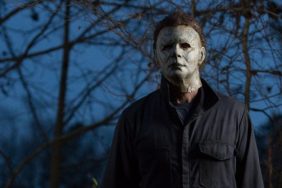We go to bat for Tobe Hooper’s often overlooked 2004 remake of The Toolbox Murders
As the year 2016 smolders down to ashes, it’s anyone’s guess what trends will end up defining this decade in terms of horror cinema. Horror movies from prior decades are much easier to categorize with regard to sub-genres prevalent in their day: the Eighties meant sequels and slashers, the Nineties had clever serial killers and irony, and the two thousands gave us torture and remakes. While the torture fad did smack a few home runs here and there, 2000-era remakes ultimately slunk away from the plate with a much lower batting average. Looking back to the remake craze and trying to sift through the wreckage with a critical eye is mostly a burden—for every one passable remake entry like Zack Snyder and James Gunn’s kinetic Dawn of the Dead (2004), fans were made to suffer through three or four stinkers that utterly disgraced their source material. Then there are the remakes that many fans probably forgot even happened—when was the last time you spared a thought remembering the newer iterations of Straw Dogs or Night of the Demons?
One of these remakes that seems absent from the conversation is the 2003 do-over of Dennis Donnelly’s cheap n’ ugly 1978 exploitation classic The Toolbox Murders. For marketing purposes—and to producers trying to sell a remake, advertising angles are priority one—Toolbox Murders labors under the disadvantage of having sprung out of a comparatively low-profile property. The original Toolbox Murders has a wonderfully-descriptive title and a show-stopper of a bathtub scene midway through, but it holds little name recognition outside of the hardcore horror community. The remake does boast one sizeable marketing advantage in that it’s directed by a bona fide, indisputable Master of Horror in the great Tobe Hooper; he’s someone who can claim to actually having created one of those durable horror titles that studios drool over and which will continue to rake in grosses for years on brand name alone.

Hooper was inarguably on the tail end of a long and steady decline when the Toolbox Murders gig surfaced. With other Masters, it’s debatable that they peaked with their first major outing—that, say, Craven’s Last House on the Left betters A Nightmare on Elm Street, or that Raimi’s The Evil Dead trumps Evil Dead 2. With Hooper, you’d be hard pressed to find someone who’d side with anything other than the first The Texas Chain Saw Massacre in debating where the crest of his filmography lay. Here, Hooper is in his Mortuary and Crocodile form, mainly hampered by a tiny budget and struggling to lift the film out of the ordinary. Hooper shouldn’t be judged too harshly; rumors abound that he was stuck having to edit together an unfinished film after one of the production companies financing Toolbox Murders went under in the middle of shooting. During their DVD commentary, Hooper and prolific screenwriters Jace Anderson and Adam Gierasch (also behind Hooper’s aforementioned Mortuary and Crocodile) fiercely refute this report, though the subplot of a main character grieving over her late father that is abruptly dropped tends to support the former claim. Either way, Hooper can’t help but be able to stage a jump scare or a tense walk down a dark hallway with the expected craftsmanship and efficiency of a filmmaker with his credentials. That all said, the Toolbox MVP comes in the form of Hooper’s star, Angela Bettis. Rightly beloved by fans for her top-lining turn in the previous year’s May, Bettis imbues what is really a bland, straight, and unchallenging role with personality and true vulnerability. Her talent is even mighty enough to sell her character’s requisite bonehead moves when fleeing (or more accurately, NOT fleeing) the deranged killer in the third act.
The plot of Toolbox Murders is as desiccated as any murder-set-piece affair tends to be: A rundown Hollywood apartment complex undergoing renovations as married couple Nell (Bettis) and Steven (Brent Roam) move in. Nell notices a number of her neighbors have quietly disappeared, and she decides to play Nancy Drew by sniffing around the building’s denizens, with all their stock quirks. We get the promiscuous girl next door, the spooky old codger with pages of expository dialogue, and the ‘red herring’ angry handyman (here played by screenwriter Gierasch, shuffling down the halls clad in oily coveralls and a truly awful wig.) Toolbox draws out the mystery and works some supernatural allusions into the story, but the raison d’etre here is the kills, and Toolbox does deliver on its title’s promise with loads of bloody, stylized goodies. Assuming that most viewers would catch the film on the Lionsgate DVD, more explicit and far superior cuts of the murder sequences are included on that disc as an extra (drill, baby, drill!). The killer him (or her) self adopts the ski mask look of the original film early on, and Hooper ads in a dash of Phantom of the Opera-esque disfigurement and a subterranean lair for the killer to poke around in. Toolbox is also notable for a cameo appearance by Sheri Moon Zombie as the film’s opening victim, done as a favor to Hooper and marking her only onscreen appearance where she was not being directed by her husband.
The Toolbox Murders is the rare remake that honors the original; it moves along briskly, takes grisly joy in its kill scenes, and having Bettis in anything is a treat. It’s no classic, but neither was the first one. It deserves to enter the discussion when the topic turns to determining just how many decent remakes managed to emerge from 2000-era swamp. And if Toolbox’s status in the upper echelon of remakes is ever in doubt, try putting it in context and pair it on a double bill with The Fog (2005)… or The Hitcher (2007) … or Pulse (2003)…or…









